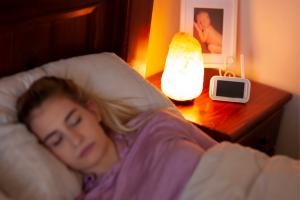Baby monitor impacts sleep in healthy adults
Given the rise in sleep disturbances coincides with the widespread deployment of mobile phones and Wi-Fi enabled devices, the study used a digital device (baby monitor) to investigate the impact of radiofrequency radiation on sleep. The results showed that adults exposed to the radiation from a baby monitor over 7 consecutive nights experienced sleep disturbances, with over a quarter of participants above the threshold for risk of clinical insomnia. During exposure there was an increase in gamma, beta, and theta waves during non-rapid eye movement (NREM) sleep which signifies a disruption of normal sleep patterns arising from an unusually active brain during what should be a period of deep rest. These findings raise concerns about the impact of radiofrequency radiation on sleep physiology, particularly for infants and children, and underscore the need for further research and careful consideration of wireless device placement in sleeping areas. This is a significant finding as sleep disturbances are a major risk factor for various health issues, including cardiovascular disease, metabolic disorders, mortality, Alzheimer's disease, and mental health disorders in young adults.
Lead researcher, Dr Nicole Bijlsma, stated, "Our study is the first to investigate the potential impact of radiofrequency electromagnetic field (RF-EMF) exposure from a commercially available Wi-Fi enabled device over 7 consecutive nights on sleep in healthy adults in a real-world setting (in participant’s homes as opposed to a sleep laboratory). The results of the pilot study suggest there may be a link between the two and further research is needed to fully understand the implications." The study has already sparked discussions among parents and experts about the use of technology in the bedroom and its potential effects on sleep.
The study suggests that exposure to the radiation emitted from a Wi-Fi enabled device may impact sleep in some people under real-world conditions. Until further large-scale real-world investigations can be undertaken to verify or disprove these findings, Wi-Fi enabled devices and cell phones should be avoided in bedrooms.
For more information, please contact:
Dr Nicole Bijlsma (nicole@aces.edu.au)
Dr Nicole Bijlsma
Australian College of Environmental Studies
+61 417 310 002
nicole@aces.edu.au
Visit us on social media:
Facebook
LinkedIn
Baby monitor impacts sleep in healthy adults
Legal Disclaimer:
EIN Presswire provides this news content "as is" without warranty of any kind. We do not accept any responsibility or liability for the accuracy, content, images, videos, licenses, completeness, legality, or reliability of the information contained in this article. If you have any complaints or copyright issues related to this article, kindly contact the author above.




